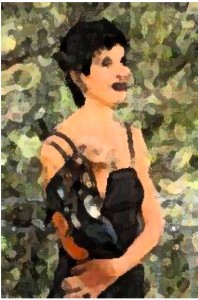August 5, 2008
May all beings be at ease.
Whatever living beings there may be;
Whether they are weak or strong, omitting none,
The great or the mighty, medium, short or small,
The seen and the unseen,
Those living near and far away,
Those born and to-be-born,
May all beings be at ease!
—from the Metta Sutta
A couple of years ago at the tango club La Nacional in lower Manhattan, I met a man, whom I’ll call Kevin. I don’t recall his name for certain, but he was blond and looks like a Kevin in my memory bank. He was from  Neptune, New Jersey, a shore point, and I’m a native of the state, with many kinfolk still there, so this was like instant insider info.
Neptune, New Jersey, a shore point, and I’m a native of the state, with many kinfolk still there, so this was like instant insider info.
It came to pass that Kevin and I had taken the class offered before the milonga at La Nacional and he was the only leader who could do the pattern being taught. He was also humble and congenial. He was free of the higher-than-thou attitude of those men who are drawn to the dance because their social skills are lacking (really it is a painful self-absorption that makes them appear haughty, so I pity more than begrudge them). You come up against the charms of someone like Kevin who dances beautifully and who is unabashedly nice and you are willing to put up with anything in the sometimes Mean Streets of the Milonga.
After the class when the milonga started and while the floor was still wide open, I was, in my own self-absorbed way, confident that Kevin would invite me to dance asap. But when I looked to him with the let’s dance look, and a subtext that said since we know what we’re doing, he demurred. “Later.” He gently explained, “I devote the first hour of milongas to dancing with beginners.”
The earth stood still and I lowered my gaze. The heavens opened up and angels’ trumpets backed up the bandoneons of the tango music playing. Behold, before me, a true bodhisattva—one of those enlightened beings who volunteer to stay behind and help others reach liberation before they will enter Nirvana.
His kindness and selflessness were rare in the milonga. Instead of scaring away newbies, which happens frequently, he was treating them with compassion. Not with the haughtiness of those jaded ones who think they have the steps down and you will make them look bad if you don’t match their level.
I wanted to be like Kevin, someone who loves the dance and his fellow dancers “whether they are weak or strong, omitting none.” I thought how his generous act pays itself forward and backward. It benefits all beings. The fragile beginners will gain confidence and stay around and the milongas will get healthier all around. And, the world is a better place, because as my late great father used to say, “You can’t NOT smile when you dance.”
Kindness. It sounds like something that should be as ubiquitous as the seashell fragments under my feet here at the Jersey Shore where I am for the summer. But it’s not.
I came across a book called The Power of Kindness by Piero Ferrucci (read this great review). At first I thought, What? Do we need a thick volume to tell us about what seems self evident and instinctual? Of course, we don’t. It’s just that these days kindness (especially here at the crowded shore) seems to be such a diversion from the usual Mean Streets of everywhere you go—on land, sea, and in the air. It is rare enough to actually be a form of entertainment. A random act of kindness makes the earth stand still and heaven open up.
LovingKindness (yes, one word) is the theme of the Metta Sutta, the Buddhist sutra, or scripture, that the peacefully resisting monks in Myanmar chant these mean days as the military beats, tortures, and kills their numbers. It is a sutra frequently chanted by Zen and Vipassana students. Sylvia Boorstein one of the most emulated dharma teachers (at Spirit Rock, Fairfax, CA), says the Metta Sutta is her favorite and she takes it everywhere she goes. That’s good enough for me. But I must confess that the first time I heard of such a thing, at the San Francisco Zen Center, I thought it was corny and ligthweight—to chant about loving kindness.
Until I really needed it.
It was the very sutra I desperately took refuge in, (along with tango itself) memorizing it, when my tango obsession led to complications . . . and then toxic hatred . . . and then and then . . . (all covered in my book, Tango––a love story with a happy ending.)
After all was said and done (some of which I would have un-done, un-said), I no longer think it’s corny to tout kindness in the milonga, on land, sea, or in the air. Au contraire. Its value can’t be overstated. Interestingly, I can’t recall if I did later dance with Kevin, but his shining example still looms large in my memory.
It’s easy for me to be kind when I step into the music because I’m always happy and centered dancing—a gift from both of my parents. When I’m not dancing, I often say just this one little line of the Metta Sutta to myself: May all beings be at ease. Not “happy” but “at ease.” I like this translation’s slightly ironic echo of the military call, because often that is all we need, to relax our militant, stiff and over-flexed muscles—due to constant adrenalin calling us to flight or fight. In tango that is always the case, that the dance happens when your muscles are free of willfulness of meanness, free of militancy, of self-absorption. And it follows that we’re naturally kind, open-hearted, compassionate, happy. And really, really good dancers.
Here is the Metta Sutta in full. There are other translations. I like this one. If some phrases sound awkward, remember that it harkens back some 2,500 years.
This is what should be done
By one who is skilled in goodness,
And who knows the path of peace:
Let them be able and upright,
Straightforward and gentle in speech.
Humble and not conceited,
Contented and easily satisfied.
Unburdened with duties and frugal in their ways.
Peaceful and calm, and wise and skillful,
Not proud and demanding in nature.
Let them not do the slightest thing
That the wise would later reprove.
Wishing: In gladness and in safety,
May all beings be at ease.
Whatever living beings there may be;
Whether they are weak or strong, omitting none,
The great or the mighty, medium, short or small,
The seen and the unseen,
Those living near and far away,
Those born and to-be-born,
May all beings be at ease!
Let none deceive another,
Or despise any being in any state.
Let none through anger or ill-will
Wish harm upon another.
Even as a mother protects with her life
Her child, her only child,
So with a boundless heart
Should one cherish all living beings:
Radiating kindness over the entire world
Spreading upwards to the skies,
And downwards to the depths;
Outwards and unbounded,
Freed from hatred and ill-will.
Whether standing or walking, seated or lying down
Free from drowsiness,
One should sustain this recollection.
This is said to be the sublime abiding.
By not holding to fixed views,
The pure-hearted one, having clarity of vision,
Being freed from all sense desires,
Is not born again into this world.
If anyone knows “Kevin” or if he reads this, love to hear from him.